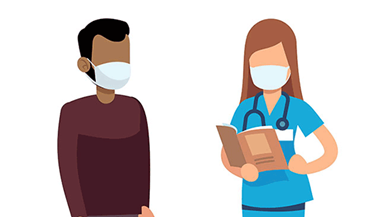COVID Symptoms — Frequently Asked Questions
Reviewed By:
Do you know the symptoms of COVID-19? 如果你或你爱的人生病了,了解这些警告信号可以帮助你采取正确的措施. Lisa Maragakis, M.D., M.P.H., 约翰·霍普金斯卫生系统感染预防高级主任, explains what to look for and when to get help.
What are symptoms of COVID-19?
The most common symptoms are:
- Cough
- Fever or chills
- Shortness of breath or difficulty breathing
- Muscle or body aches
- Sore throat
- New loss of taste or smell
- Diarrhea
- Headache
- Fatigue
- Nausea or vomiting
- Congestion or runny nose
其中一些症状非常常见,可能是由COVID-19以外的许多疾病引起的, the disease caused by the coronavirus called SARS CoV-2. If you have any of the symptoms, contact a doctor or other health care provider, 谁可以评估你的风险并帮助你确定下一步.
Emergency Warning Signs of Severe COVID-19 — When to Call 911
如果您或您的家人正在经历以下任何症状, 立即拨打911或当地急诊室,并让接线员知道您正在呼叫可能感染COVID-19的人:
- Difficulty breathing
- Persistent pain or pressure in the chest
- New confusion
- Inability to wake up or stay awake
- Bluish lips or face
There are other possible symptoms of COVID-19. 打电话给你的医生或健康护理中心,了解任何严重或与你有关的症状.
When should I contact a doctor about my symptoms?
If you feel ill, 打电话给你的医生办公室或保健中心,在电话里解释你的症状. 接下来的步骤将被讨论,包括你是否应该有一个 coronavirus test. If it turns out that you have COVID-19, 轻症患者可在家休养和自我隔离. If you become severely ill, you may need hospital care.
如果我接触了冠状病毒,多长时间才会出现症状?
症状可能在感染SARS-CoV-2后2至14天开始. A study 由约翰霍普金斯大学彭博公共卫生学院的研究人员领导的一项研究表明,出现症状的平均时间约为5天, however, CDC research 表明出现组微粒症状的中位时间大约是三天.
如果你怀疑自己接触过或密切接触过COVID-19患者, you should self-quarantine, 注意症状,并考虑在接触后四五天进行检测. 接触是指与感染了SARS-CoV-2的人接触, the virus that causes COVID-19, 在某种程度上增加了感染病毒的可能性. 密切接触是指在24小时内与感染者(实验室确诊或临床诊断)的距离不超过6英尺,累计时间不少于15分钟.
Please review CDC guidelines for isolation and quarantine to help prevent the spread of COVID-19
What are the first symptoms of coronavirus infection?
一些人报告的早期症状包括疲劳、头痛、喉咙痛和发烧. Others experience a loss of smell or taste. COVID-19 can cause symptoms that are mild at first, but then become more intense over five to seven days, with worsening cough and shortness of breath. Some people who have COVID-19 develop pneumonia.
首发症状的类型和严重程度因人而异. 这就是为什么如果你有症状,即使是轻微的症状,打电话给你的医生是非常重要的.
Can you have the coronavirus without a fever?
Yes. A fever is one of the common symptoms of COVID-19, 但你可能感染了冠状病毒,有咳嗽或其他症状,但没有发烧, or a very low-grade one — especially in the first few days. 请记住,冠状病毒也有可能出现轻微症状,甚至根本没有症状. 没有症状的冠状病毒感染者仍然可以将病毒传播给他人.
Can you have the coronavirus without a cough?
Yes. 咳嗽是COVID-19的常见症状之一,但并不总是存在. 你可能感染了冠状病毒而不会咳嗽. 如果你有,它可能是轻微的和不频繁的,或者你可能会咳嗽得很厉害. 请记住,感染COVID-19有可能只出现轻微症状,甚至根本没有症状. 没有症状的冠状病毒感染者仍然可以将病毒传播给他人.
Can COVID-19 symptoms come and go?
Yes. During the recovery process, COVID-19患者可能会出现反复出现的症状,同时感觉好转. Varying degrees of fever, fatigue and breathing problems can occur, on and off, for days or even weeks.
Can you have COVID-19 without symptoms?
Yes. COVID-19的症状通常在接触SARS-CoV-2后2至14天出现, 但是一些被感染的人没有出现症状或感觉不舒服. When this happens, a person is called asymptomatic. 这就是为什么戴口罩、保持身体距离和手卫生如此重要的原因. 人们可能感染了导致COVID-19的病毒而没有意识到这一点, but still be able to transmit the virus to other people.
What are COVID-19 symptoms in children?
Like adults, babies and children with COVID-19 会有发烧、咳嗽、喉咙痛、呼吸困难和腹泻等症状吗. 联合国儿童基金会最近的数据表明,儿童病例一直在增加 American Academy of Pediatrics.
Children may also be at risk for multisystem inflammatory syndrome in children (MIS-C) — an uncommon but serious complication of the coronavirus. 父母和监护人应该警惕misc的迹象,如果出现,立即打电话给孩子的医生.
Coronavirus Symptoms and Other Conditions:
冠状病毒症状与过敏症状有何不同? What about flu, colds and strep throat?
COVID-19与过敏、流感和链球菌性咽喉炎等其他疾病有共同的症状. 如果不进行测试,可能很难区分COVID-19和流感.
If you have symptoms that might be due to the coronavirus, contact a health care provider, 描述您的症状并遵循医生的建议.
Learn more about COVID-19 and the flu.
如果我接种了冠状病毒疫苗,我会出现COVID-19症状吗?
No. 美国食品和药物管理局批准的COVID-19疫苗不能也不会给你带来COVID-19. These coronavirus vaccines 会因为激活免疫系统而产生副作用吗, 但这并不意味着你感染了冠状病毒或你患有COVID-19. 随着你的免疫系统对疫苗做出反应,学会识别和对抗冠状病毒, fever, pain at the injection site and muscle aches are possible, but these are usually both mild and temporary. Learn more about the safety of the coronavirus vaccines.






